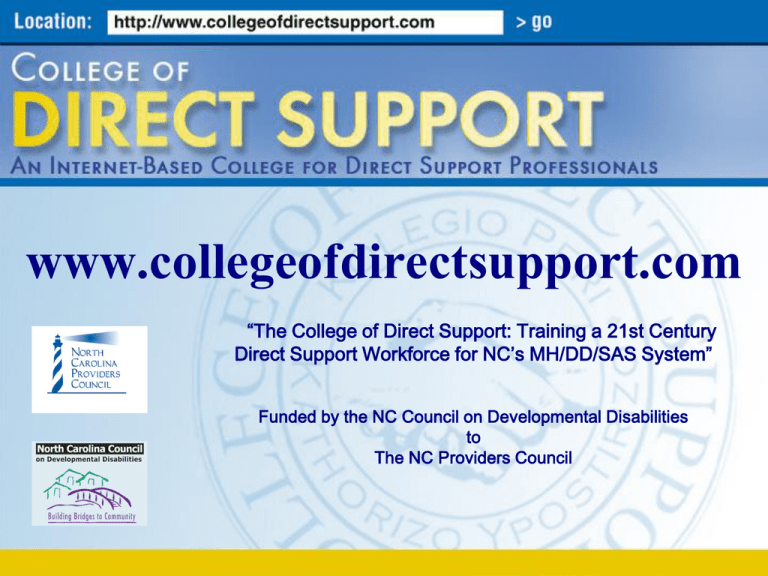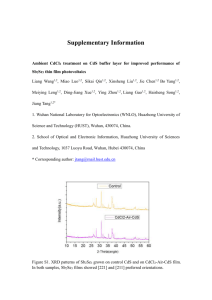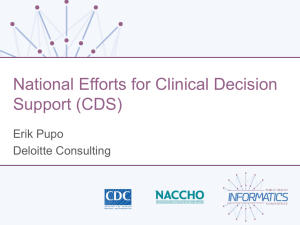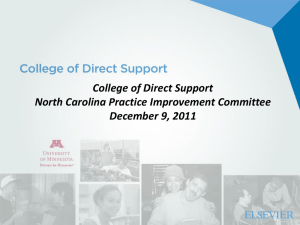The College of Direct Support - Direct Care Workers Association of
advertisement

www.collegeofdirectsupport.com “The College of Direct Support: Training a 21st Century Direct Support Workforce for NC’s MH/DD/SAS System” Funded by the NC Council on Developmental Disabilities to The NC Providers Council Catalyst for Change NC Council on Developmental Disabilities • 34-member body appointed by Governor (PL 106-402, DD Act) • Federally funded to promote policy and practice innovations in Intellectual/Developmental Disabilities (I/DD) • Investments in systems change, advocacy, and capacity building initiatives – many, cross-disability • FMI: www.nccdd.org www.collegeofdirectsupport.com Supporting a 21st Century Direct Care Workforce A project funded by the NCCDD Mission Statement The College of Direct Support is a learning gateway for contemporary best practices for direct support professionals. By incorporating web-based learning, backed by nationally recognized curricula, the CDS is designed to help support a profession of direct care. Momentum: National Policy Direction • 4.3 million Americans with I/DD • Ensure that individuals of all ages receive, throughout their lives, supports/services they need to live with dignity as fully included citizens • Access to and quality of Direct Support Professionals (DSPs) is key to realizing goals of the Americans with Disabilities Act US HHS Report to Congress - 2006 Promoting a “Next Generation” Workforce • 2004-2014: NC Employment Security Commission: DSPs among NC’s “top 10 fastest growing occupations” • FMI: “Direct Support Professional Work Group Report,” NCCDD in collaboration with CMS National Resource Center on Direct Support Workforce (2007) Rising to the Challenge • Retaining existing DSPs • Meeting increase in demand across increasingly diverse populations Addressing turnover Low wages and limited access to health insurance Meeting the need for comprehensive, costeffective, competency-based training NCCDD Workforce Goals • Establishment of state-wide, competency- and values-based, portable training and certification requirements for DSPs, supervisors • State-level certification and career path based on demonstration of these competencies • “Birth of a new profession” Investing in Change: College of Direct Support • Competency- and values-based, portable, nationally recognized curriculum 40,000 learners 300 agencies 23 states • Grantee: NC Providers Council $300,000 investment over 3 years • Test Pilot – Tailored to NC’s Needs North Carolina Providers Council • Bob Hedrick, Executive Director • The NC Providers Council is largest crossdisability mental health, intellectual/developmental disability and substance abuse service provider association in North Carolina. Our 92 members support over 85,000 people who receive mh/dd/sa services in every county across North Carolina through over 30,000 employees of Providers Council members What is the College of Direct Support(CDS)? CDS is an online, self-paced training program and learner management system designed for direct support professionals and entry-level managers. The curriculum effectively utilizes multimedia and interactive instructional activities and includes pre- and post-testing as well as a mentor-based competency component. The CDS provides agency participants with a database to manage and analyze participant data. CDS Evaluation Participants • 9 organizations Staggered entry As early as 7/07 and late as 9/09 • Total number of DSP learners – 2,526 CDS Pilot Statewideness Preliminary CDS Evaluation Results • Learner outcomes 123,932 completed lessons/hours of completed training +25.3% average change in pre/post test score Highest test score change +50.3 (cultural competence continuum); lowest test score change +11.2 basics of grooming and dressing) CDS Preliminary Outcomes DSP Training Courses Completed DSP Training Courses Completed • • • • • • • • • • • Civil Rights and Advocacy (138) Community Inclusion (1,191) Cultural Competence (1,238) Direct Support Professionalism (1,091) Documentation (1,143) Employment Supports (1,043) Communication (106) Functional Assessment (993) Working with Families and Support Networks (957) Friendship (1,074) • • • • • • • • • Individual Rights and Choice (1,110) Intro to DD (1,209) Intro to Medication Support (1,030) Maltreatment of Vulnerable Adults and Children (1,082) Person Centered Planning and Thinking (1,017) Personal Care (1,298) Positive Behavior Support (1,088) Safety at Home and Community (1,034) Supporting Healthy Lives (1,017) Teaching People with DD (1,025) CDS Preliminary Outcomes • Supervisor Courses Fueling High Performance (360) Recruitment and Selection (361) Training and Orientation (354) Preparing for the Supervisors Job (2 brand new course) “Empowerment! We strive for empowerment for the people we serve and now with the CDS we can give that same Empowerment to our employees.” •DSP CDS Learner “College of Direct Supports offers so much more information and so much more technical training that it far surpasses any type of classroom experience you could have. Working at your own pace and on your own schedule makes the learning experience very personalized to you. I do think it is THE best training curriculum I have ever seen for overall responsibilities of group home staff and supporting people and over this last 25 years I’ve seen a lot.” Cynthia VanCamp, Qualified Professional, Independent Living Preliminary CDS Evaluation Results • Organizational Outcomes Decrease in DSP turnover • Range from -5.5% to -19.4% Lower then average early leaver turnover • Range is 2-19% • Previous studies would indicate average of 68% Two of the larger programs have been able to report increased retention of CDS completers as compared to noncompleters (note – smaller organizations were unable to report this data) Preliminary CDS Evaluation Results • Organizational outcomes (cont.) Reported improved ability to recruit and retain • Employees feel values and like they have more knowledge • We provide a tool and resource to staff with the CDS – it makes it so clear how to do things and staff can go back to it as a reference • WIN program was developed to help staff go to college; CDS is a gateway to college and this program • CDS graduates now welcome and train new DSPs through CDS kickoffs CDS Changes Lives • Staff who have never used a computer now know how to • Staff are going on to college programs • DSPs have become more assertive and involved in suggesting changes and taking initiative to make things happen for people they support Year 3 Initiatives • Technical Assistance funding to market results and further attempt sustainability • Materials at the state level for approval of state mandated training curriculum. • New Training Modules in Civil Rights Advocacy, Communication and Autism • Recognition on the National Level of the unique and successful implementation of the CDS training











